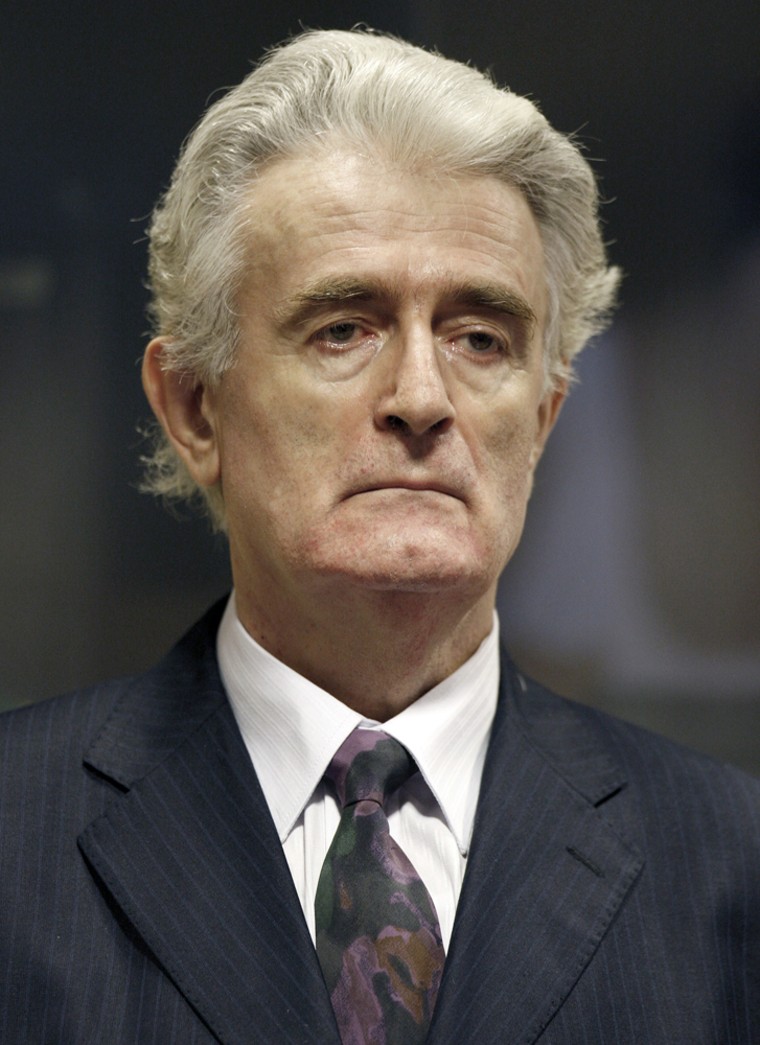A U.N. judge Tuesday rejected a plea from former Bosnian Serb leader Radovan Karadzic for more time to prepare his defense and ordered his long-awaited war crimes trial to begin next month.
Karadzic, who led the Bosnian Serbs through a brutal three-year ethnic war in the early 1990s, had asked for another 10 months to sort through the "millions" of documents and hundreds of witnesses prepared by the prosecution.
But Judge O-Gon Kwon refused, and set a trial date for Oct. 19. Another pretrial hearing will be held Oct. 6 to clear away final issues and confirm the date, he said.
Kwon said he expected the case to last 2 1/2 years or at most three years until a verdict is delivered.
‘This will not be a proper trial’
Karadzic, who is defending himself, objected to the commencement date, claiming his case is the most voluminous and complex that the Yugoslav tribunal has conducted since it was created in 1993. Without more time to prepare, "this will not be a proper trial."
Prosecutors "ambushed me with huge amounts of material which was not that important," he said, asking the judge repeatedly to reconsider.
But Kwon said Karadzic had had enough time to prepare since his arrest nearly 14 months ago, and had a stable of legal consultants and assistants to help him.
"I think that's more than sufficient. This has been ruled and I will not revisit this issue again," said the South Korean judge.
"The chamber will do its utmost to ensure you will have a fair and expeditious trial," Kwon assured Karadzic.
Karadzic, a former psychologist and Bosnian politician, is charged with 11 counts of war crimes during the 1992-95 Bosnian war, including genocide for the killing of 8,000 Muslims in the U.N.-declared safe zone of Srebrenica in July 1995. He has denied wrongdoing.
He was captured last year on a bus in Belgrade, where he had been disguised with a heavy white beard, long hair and thick glasses and preaching new-age philosophies.
Prosecutors told the judge they were ready to drop some of their witnesses and remove some allegations from the indictment to fit the demanding schedule, but Kwon urged them to further trim their case.
Shortage of courtrooms and judges
Karadzic's earlier indictment listed alleged crimes in 45 cities and towns. The prosecution already had cut that to 27, but Kwon asked whether the number could be reduced to a dozen at most.
To save time, Kwon said the prosecution should consider excluding "incidental killings" as opposed to planned and organized murders. In other cases, such deaths could be crucial, but for a defendant who is "indicted for genocide the significance may be less," he said.
Kwon said the court will be able to convene only three times a week for 3 1/2 hours a day because of a shortage of courtrooms and judges. Two of the three judges who will hear his case are involved in other trials, and only three courtrooms are available for eight separate trials.
The U.N. Security Council had asked the Yugoslav tribunal to close its doors next year, but gave it several extensions because of Karadzic's case and several others. Two war crimes suspects are still at large, including Karadzic's top general, Ratko Mladic.
On Monday, prosecutors in another case asked tribunal judges to hand down life sentences to seven Bosnian Serb military and police officers from Karadzic's regime for their role in the Srebrenica massacre. The prosecution's summation came at the end of a three-year trial for the officers, including three who were indicted for genocide at Srebrenica.
